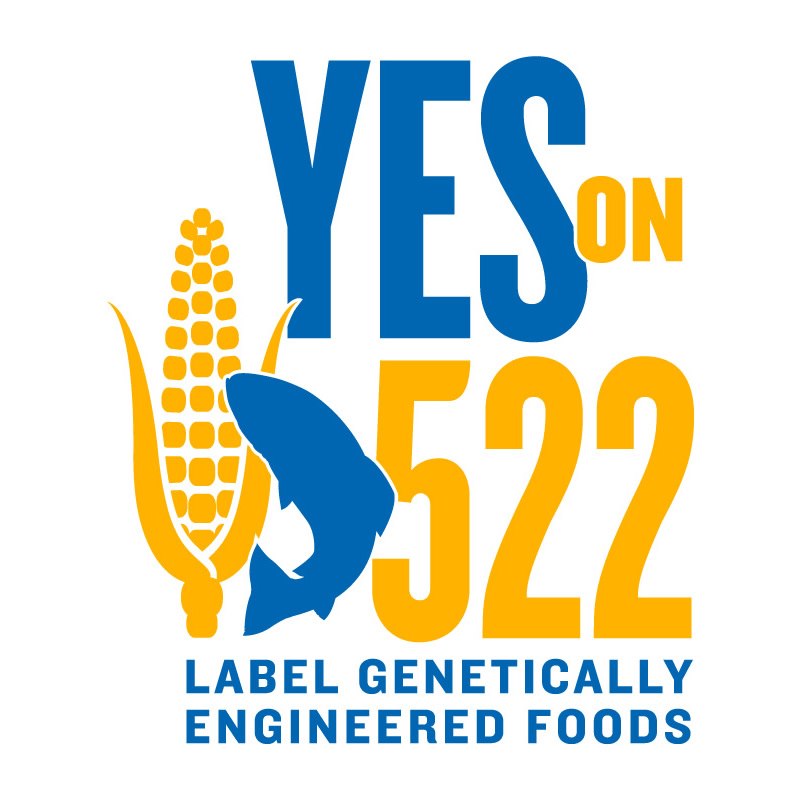With the local political season focused on the mayoral primary, other races and ballots measures have have faded into the background. Quietly, though, campaigners on both sides of Initiative 522—the measure that would label genetically engineered food–have been raising millions of dollars. A high-stakes battle of national interest is in the offing, one also indicated by some heated rhetoric that is just starting to simmer.
The influx of cash follows the precedent set in California, where more than $50 million was spent fighting over a similar measure, Proposition 37. There, however, agricultural and industry groups opposed to labeling massively outspent the proposition’s proponents. The no campaign poured $45 million into the battle, while the war chest of labeling supporters amounted to just $6.7.
But it’s the yes campaign that’s currently in the lead here. As of the last filing with the Public Disclosure Commission, I-522’s backers had raised nearly $2.3 million—and Yes on 522 spokesperson Elizabeth Larter says the campaign is “probably going to be in the 3 range” when it files a new report next week. In contrast, the no campaign had by the last filing raised just under a million dollars. Spokesperson Dana Bieber says she can’t comment on forthcoming funds.
The fundraising reports for the two campaigns are strikingly different in other ways. The the no campaign tally lists just five donors, all deep-pocketed organizations from out of state. The Washington DC-based Grocery Manufacturers Association has chipped in roughly $473,000. Monsanto, the huge corporation that produces genetically-engineered seeds, has donated $242,000.
The list of donors is far more extensive on the yes side. Larter claims that 80 percent of them are individuals from within the state. But they also include some wealthy out-of-towners. The yes side’s largest contributor is Dr. Bronner’s Magic Soaps, a California producer of organic products that has given a whopping $700,000 to the campaign. The company is also rolling out what it calls an “agitprop label,” promoting I-522, on some of its soaps, starting in September. In addition, CEO David Bronner plans to make a personal appearance at Hempfest this month to stump for the initiative.
Bronner, speaking to SW this week, says the initiative has no bearing on his company’s bottom line but is in line with its values. “We believe in sustainable agriculture and fair trade,” he explains, adding that he is “very concerned about what the chemical industry is doing to our food.”
Despite his sizable donations, Bronner says the yes campaign is unlikely to stay ahead in the fundraising race. He gave money to supporters of California’s Prop 37 too, and in that battle he says industry groups didn’t put in a lot of their cash until late in the game. “They’re not going to tip their hand,” he says.
Similarly, Larter says: “We’re waiting for the other shoe to drop…We’re going to be outspent.”
Refraining from specifics, the no campaign’s Bieber will say only that she’s “confident that we’ll have gas in the tank,” although she does note that she doesn’t expect the overall tally to match California’s. Campaigning in that state, given its bigger size, is much more expensive, she says.
Bieber is far more talkative about her side’s opposition to 522, and she’s got some novel lines of attack. She refers, for instance, to a “shakedown mafia” enabled by the initiative. A what? Here’s Bieber’s explanation: “They wrote this little provision in there that says that anybody can go into a store and see if they think there’s a violation [of the initiative].” A food producer found to be in violation would be subject to onerous $1,000-a-day fines, she says.
What she’s referring to is a provision that empowers the state Department of Health to fine violators an amount “not to exceed” one thousand dollars. Larter claims that, in reality, fines are likely to run closer to $100 a day.
Bieber also assails I-522 for what she calls its “zero-tolerance” clause. There is no such term in the initiative. But Bieber explains that she’s referring to the initiative’s requirement that foods be labeled even if they are only “partly produced” with genetic engineering. “That tells you if it has a spec of GE in it, it’s in violation,” she says. “It’s a spec! It’s a molecule!”
In fact, the provision allows a very small percentage of a product–.9–to be made of genetically modified organisms before it needs to be labeled. That’s the same as in the European Union, according to Larter. But that tolerance level would expire in July 2019.
Of course, the pro-labeling camp has an aggressive line of attack as well, one dealing more generally with the allegedly nefarious and poisonous influence of profit-driven agribusiness.
It’s a debate increasingly heard around the country. Maine and Connecticut recently passed labeling requirements and other states are considering them. Given the money already coming in, you can expect the volume to be turned up in this state once next week’s primary is out of the way.
***UPDATE*** Spokeswoman Bieber contacted Seattle Weekly saying she said “shakedown lawsuits,” not “shakedown mafia.”








